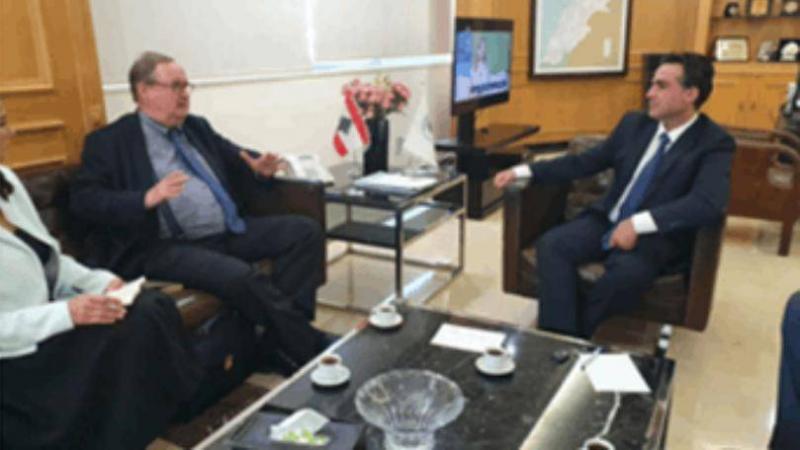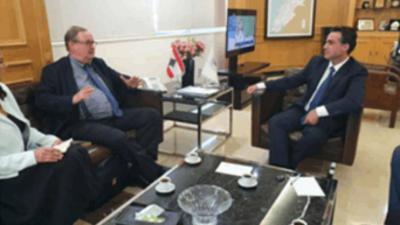The Minister of Public Works and Transport in the caretaker government, Ali Hamieh, met with the International Aid Coordinator for Lebanon, Ambassador Pierre Doukan, and the accompanying delegation. They discussed the situation in Lebanon in general and the relevant topics of the ministry, such as the ports, public transport, railways, and the reconstruction of the Port of Beirut.
After the meeting, Hamieh noted that "since the formation of the government, the French side has been calling for reforms and an agreement with the International Monetary Fund, which it considers a crucial pathway to activating public facility operations. Our conviction is firm that reforms are the foundation for Lebanon's revival."
He emphasized that "Doukan praised the ministry's efforts towards reforms in the ports and its affiliated facilities," pointing out that "what the ministry is doing is at the heart of these reforms, and we are firmly convinced that there is no room for Lebanon's revival without undertaking these reforms through proper investment, good governance, and public facility reforms under the Lebanese state to enhance revenues and enable the state to make sound decisions."
Hamieh clarified that "the discussions also addressed the Port of Beirut, where its condition has been assessed since two years ago. There have been numerous promises from the West and the East regarding its reconstruction, and the French state has been encouraging its reconstruction since day one, considering it a vital facility for the Lebanese state." He stressed that "we are committed to this process until the end."
He continued, "We have two steps regarding the ports: the first is the new legal framework for the port sector that will be sent to the Parliament to work on its approval, and the second concerns completing the master plan for the Port of Beirut." He expressed to Doukan his "openness to work with the World Bank or any other international institution according to what we promised previously since the disaster of the massive explosion, provided they are willing to finance its reconstruction. If there is no desire or positivity regarding investment or reconstruction, we will work to reconstruct it from the increasing revenues of the port."
Hamieh added, "We also discussed railway and bus transport in Lebanon, given their importance. We will start preparing a new legal framework that organizes the partnership and relationship between the public and private sectors concerning transport to enhance the role of the private sector in Lebanon, where the state will be the regulator and the private sector the operator."
He concluded, "What the Ministry of Public Works and Transport is doing in terms of reforms, proposals, and law preparations aligns with what international institutions are requesting," asserting that "reform is the cornerstone of state revival. Therefore, what the ministry will do in reconstructing the port or revitalizing operations at the airport is not contingent on what the IMF demands, but rather our conviction that Lebanon's revival is linked to proceeding with reforms."
On another note, in response to a question regarding the free market bidding, Hamieh answered, "According to the public accounting law, there must be two or more bidders, not just one. Therefore, this matter has returned to the ministry, and we will again call for launching the bidding through the procurement department, in accordance with the public accounting law, and we will send it back to them. What is being addressed in the media in this way is related to the judiciary, the terms of reference, and the bid that took place in 2017, five years ago. This differs entirely from what we are doing now, and let us leave the matter to the judiciary to take its legal procedures regarding that bid. As for today, we have a set of terms and a procurement administration, and the law confirms the preparation of terms by the ministry to be sent to them according to the law. If there are any notes, the minister's office is open to everyone, and the terms and biddings are as transparent as possible." He encouraged everyone to "report any illegal performance, so that it can be highlighted, as the principle we work on is based on a three-dimensional equation: first, sovereignty; second, increasing revenues; and third, creating additional services to enhance state revenues, all of which culminates in applying the law meticulously."




